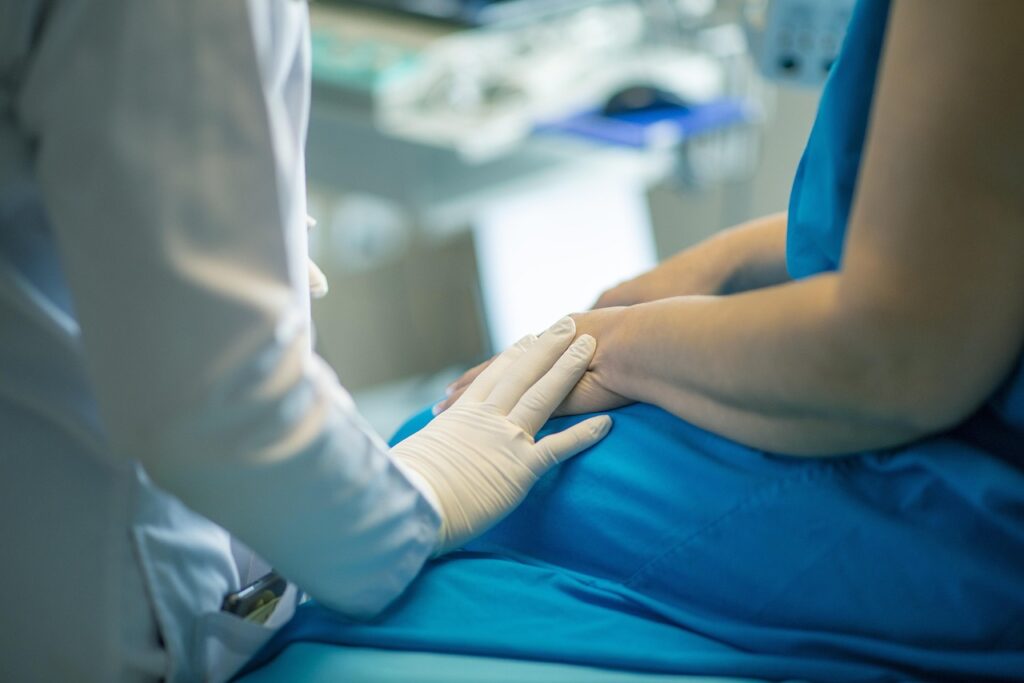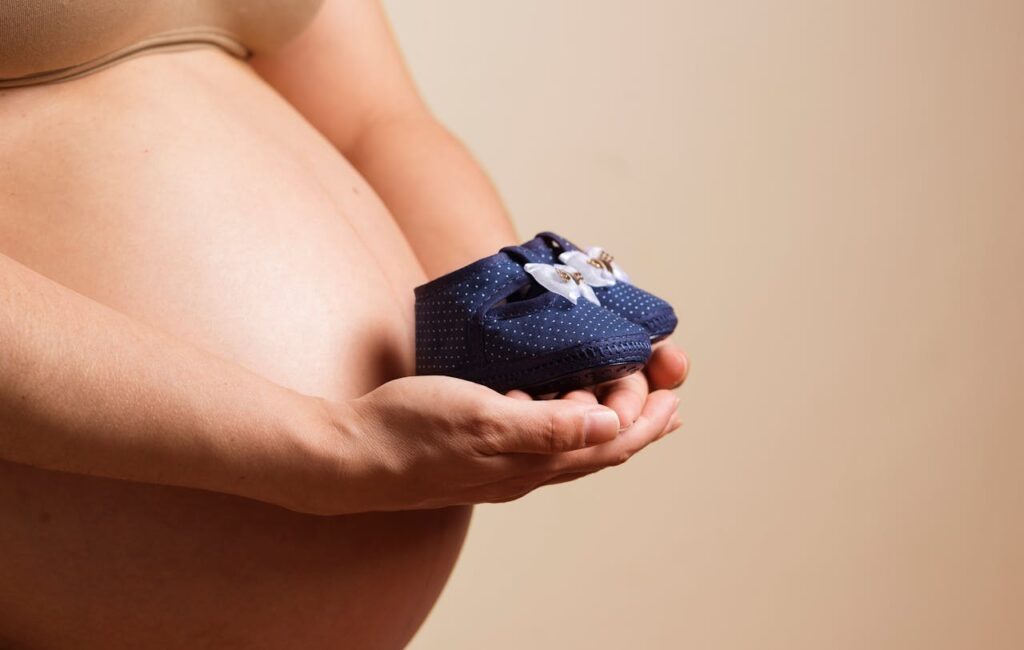
Being pregnant is both exciting and a bit scary. You’re going through many changes, and you want to make sure you’re using safe products on your skin.
Hyaluronic acid is a common skincare ingredient that you might be wondering about. We’ll look into its benefits, risks, and how to safely use it during pregnancy. This guide aims to help you take care of your skin and your baby’s health.
Introduction to Hyaluronic Acid and Pregnancy
Pregnancy is a remarkable journey. Expectant mothers work hard to keep themselves and their babies healthy. Hyaluronic acid is a compound that could help during pregnancy. Let’s look into this molecule and see how it can support pregnant women.

Benefits of Hyaluronic Acid During Pregnancy
Pregnancy changes the body a lot. Hyaluronic acid benefits pregnancy in several key ways:
- Skin Hydration and Elasticity: Hyaluronic acid keeps skin moist and elastic. This is great as the skin stretches with the baby’s growth.
- Joint Lubrication: Hyaluronic acid helps lubricate and cushion joints. This can reduce discomfort and improve movement.
- Inflammation Reduction: It has anti-inflammatory properties. This could help ease joint pain or swelling during pregnancy.
Adding hyaluronic acid and pregnancy to your routine might help you feel better. It can support your body’s needs during this special time.
Is Hyaluronic Acid Safe During Pregnancy?
Expectant mothers often wonder if hyaluronic acid is safe during pregnancy. The good news is that most studies say it’s safe for both mom and baby.
Hyaluronic acid is a natural substance in our bodies. It helps keep our skin hydrated, joints lubricated, and tissues healthy. When you’re pregnant, your body makes more of it to support the changes happening in your body.

Research shows that hyaluronic acid pregnancy safety is good. Here are some key points:
- Oral supplements with hyaluronic acid are safe for pregnant women if taken as directed.
- Using hyaluronic acid on the skin, like in skincare products, is also safe during pregnancy.
- This substance doesn’t harm the baby or the mother when used correctly. “Hyaluronic acid is a natural substance that is already present in the body, so it is generally considered safe for use during pregnancy when taken in appropriate amounts.”
Always talk to a healthcare professional before adding hyaluronic acid to your pregnancy routine. They can give you advice on the right amount and how to use it safely at your stage of pregnancy.
Knowing that hyaluronic acid is safe during pregnancy lets expectant mothers make smart choices. They can use it to support their health and well-being during pregnancy.

Hyaluronic Acid and Pregnancy: Safety Considerations
Using hyaluronic acid during pregnancy is safe, but it’s important to know the risks and safety tips. Hyaluronic acid is a natural substance in our bodies. But, pregnant women should be aware of a few things.
Potential Risks and Side Effects
Hyaluronic acid is safe because it’s natural. But, some pregnant women might feel some mild side effects. These can include:
- Skin irritation or redness
- Headaches
- Digestive issues
How Much Should You Take? Dosage and Timing Guidelines
The right amount and timing of hyaluronic acid during pregnancy depend on the product and your needs. Start with a small dose and increase it if needed, with a doctor’s advice.
For hyaluronic acid risks pregnancy, avoid high doses, especially in the first three months. Topical products like serums or moisturizers are safer because they don’t get absorbed much by the body.
Always talk to a healthcare provider before adding hyaluronic acid during pregnancy or prenatal hyaluronic acid supplements to your routine. They can give advice based on your health and pregnancy stage.

Natural Sources of Hyaluronic Acid
Hyaluronic acid is a compound known for its hydrating effects. It can be found in many natural sources. Adding these to your diet or supplements can support your health and skin during pregnancy.
Bone broth is a top source of hyaluronic acid. It’s made by simmering animal bones and connective tissue. Enjoy it alone or use it in soups and stews.
Certain types of seaweed, like wakame and kombu, are also rich in hyaluronic acid. These seaweeds offer many minerals and vitamins too. Add them to salads, stir-fries, or make a seaweed soup.
Fermented foods like yogurt, kefir, and kimchi are good for hyaluronic acid too. Fermentation makes this compound easier for your body to use.
By using these natural sources, you can nourish your body and improve your skin’s health and glow during pregnancy.
Seaweed Soup Recipe

Ingredients
- 1 cup chopped shiitake mushrooms 60g
- ½ cup dried seaweed miyeok/wakame (21g)
- 2 tablespoons roasted sesame oil
- 3 tablespoons soy sauce
- 8 cups water
- ½ tablespoon mushroom seasoning
- 1 teaspoon salt to taste
Instructions
- Soak dried seaweed in water for about 10 minutes. Give it a quick rinse and drain off excess water. Cut or chop seaweed into small bite size pieces. Set aside.
- Heat sesame oil in a pot on medium/medium high heat. Add shiitake mushrooms. Sauté until golden.
- Add seaweed and soy sauce. Sauté for about 1-2 minutes.
- Add water and mushroom seasoning. Mix thoroughly. Bring to a boil, then lower the heat to a simmer. Put a lid on and simmer for about 45 minutes – 1 hour.
- Lastly, season with salt to taste.

Hyaluronic Acid and Skin Changes During Pregnancy
Pregnancy can change the skin in many ways, from a glowing look to the appearance of stretch marks. Luckily, hyaluronic acid can help with these changes.
Hyaluronic acid is a substance found naturally in our bodies. It’s great at making the skin hydrated and plump. When pregnancy brings big changes, hyaluronic acid can ease the skin’s reaction.
Stretch marks are a common skin issue during pregnancy. Hyaluronic acid can lessen their look by making the skin more elastic and boosting collagen. This helps the skin adjust to the fast changes in size and shape.
Also, hyaluronic acid fights dryness and sensitivity that come with pregnancy. It deeply hydrates the skin, easing discomfort and keeping it looking healthy and bright.
For pregnant women wanting to keep their skin looking good, hyaluronic acid is key. It can be used in skincare products or as a supplement. This ingredient is essential for supporting the skin’s natural changes during pregnancy.

Prenatal Hyaluronic Acid Supplements
As expectant mothers, you might wonder about hyaluronic acid during pregnancy. Prenatal hyaluronic acid supplements can help with skin health and joint comfort. But, it’s important to know when and how to pick the right one.
When to Start Taking Supplements
When to start taking prenatal hyaluronic acid supplements varies. Experts suggest starting as early as the first trimester. This helps with your body’s natural processes during pregnancy. Starting early can give you benefits from the start.
Choosing the Right Supplement
Choosing a prenatal hyaluronic acid supplement means focusing on quality and purity. Look for products with bioavailable hyaluronic acid and no extra additives. Also, check the dosage as it can change based on your pregnancy stage and needs.
Adding prenatal hyaluronic acid supplements to your prenatal care is a smart move. Knowing when and how to pick the right one ensures you and your baby get the most out of this key nutrient.
Conclusion
Hyaluronic Acid and Fertility
Research is showing that hyaluronic acid is key for fertility and the reproductive system. It’s a big part of the body’s connective tissue. This makes it important for the ovaries, uterus, and other organs to work right.
Hyaluronic acid is found in high amounts in the follicular fluid. This fluid feeds the egg as it grows. It might help the egg get ready to be released during ovulation. Also, it could make the lining of the uterus ready for a fertilized egg, which could help with getting pregnant and having a healthy pregnancy.
Women who are trying to get pregnant might want to eat more foods with hyaluronic acid. Good choices include bone broth, soy, and some fruits and veggies. Talking to a doctor can help figure out the best amount and when to take hyaluronic acid supplements. This can help with fertility and a healthy pregnancy.

